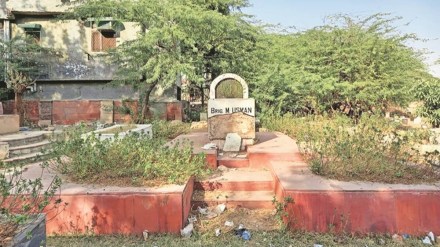“The eyes of the whole world are on us…death is bound to come sooner or later. But what can be better than dying here (on the battlefield).” These were the words of Brigadier Mohammad Usman, the Sher of Nowshera, to his fellow soldiers when he started marching to the battlefield.
The battle of Nowshera is remembered every year on 6 February. Because on this day in 1948, Nowshera became a part of India in the war of Jammu and Kashmir.
This was the same Brigadier Usman who had rejected the offer of Pakistan’s founder Mohammad Ali Jinnah to become the Chief of the Pakistani Army. But after killing the tribals supported by the Pakistani Army in Nowshera, Pakistan had put a reward of Rs 50,000 on this Brigadier Usman.
During Independence in 1947, Brigadier Usman was among the few officers who held the rank of Brigadier. Both India and Pakistan wanted to take Brigadier Usman, who had proved his bravery and military leadership in Burma (Myanmar) during the Second World War, into their respective armies. At the same time, Jinnah had proposed to make Brigadier Usman the chief of his army.
Immediately after Independence (partition), in October 1947, the war started between India and Pakistan over Jammu and Kashmir. On the orders of Lieutenant General (later Field Marshal) KM Cariappa, Brigadier Usman was given the responsibility of liberating Poonch and Jhangar areas from the occupation of Pakistani tribes and hoisting the tricolour. Because Cariappa was known as the keeper. Therefore, Brigadier Usman named this operation `Op Keeper.’
Brigadier Usman was given command of the 50th Parachute Regiment. The Brigadier had sworn that he would sleep on the ground like a soldier until Jhangar was merged with India. Being a Brigadier rank officer, if he wanted, he could stay away from the battlefield and give instructions to his subordinates and commanding officers over the phone. But he himself used to lead from the front.
During the battle of Nowshera, the Indian Army killed 1000 Pakistani tribesmen and the same number were injured. Due to the death of such a large number of their comrades, Pakistani tribesmen had fled Nowshera. The number of Indian Army killed in action was only 32 and the number of injured was 100. Nowshera was captured by the Indian Army and since then Brigadier Usman was given the title of Lion of Nowshera. The tremendous attack of Brigadier Usman created panic in the Pakistani Army and a reward of Rs 50,000 was offered for his arrest or killing.
Once when Pakistani tribals were taking shelter in the mosque, they did not hesitate in attacking the mosque. He believed that it was necessary to kill the enemies. Due to this incident, his respect among all the Indian soldiers had increased a lot.
After conquering Nowshera, it was the turn of Jhangad. After the defeat in Nowshera, now the Pakistani army had fully entered the battlefield and was shelling the Indian fronts with cannon. Ultimately, after three months of war, Jhangad completely became a part of India. Despite this, Pakistan did not stop the shelling. To create psychological pressure on Indian soldiers, Pakistani newspapers kept publishing false news about the death of Brigadier Usman. To deny one such news, he issued a message that I am completely fit and thriving… I am still in the world of living life. But after this message he could not stay alive for long.
On the evening of 3 July 1948, Brigadier Usman was strolling after a meeting in his brigade headquarters. Meanwhile, the Pakistani army started shelling the brigade headquarters. One shell fell close to Brigadier Usman and India’s most senior military commander was martyred on the battlefield.
Even today, Brigadier Usman is the only military officer who made the supreme sacrifice on the battlefield while holding this rank (Brigadier). At that time, Brigadier Usman was only 36 years old. It is said that if he had remained alive, he would have definitely become the chief of the Indian Army. He was three days senior to Field Marshal Sam Manekshaw in the Indian Army.
When the last journey of Brigadier Usman was taken out in the capital Delhi, a large number of common citizens including the then Prime Minister Jawaharlal Nehru and Governor General Lord Mountbatten participated.
For his bravery, indomitable courage and efficient leadership, the government awarded him the Mahavir Chakra, the country’s second highest gallantry medal. Even today his memorial is in Jamia Millia Islamia (University) of Delhi. Apart from this, the Indian Army has built a memorial in his memory near the rock where he breathed his last in Jhangad-Nowshera.
